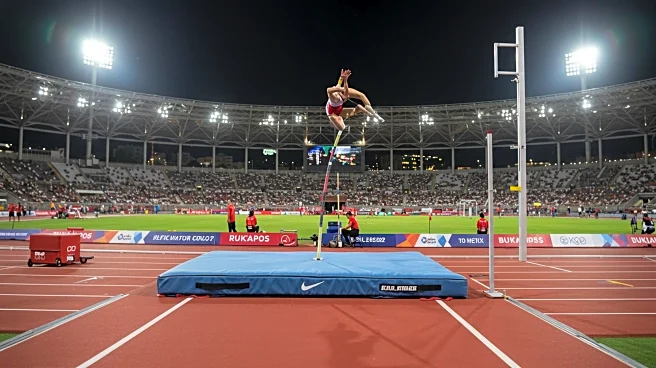What's Happening?
Mondo Duplantis, a Swedish pole vaulter and two-time Olympic gold medalist, has set a new world record in the men's pole vault by clearing 6.29 meters at a meet in Budapest, Hungary. This marks the 13th time Duplantis has broken the world record, continuing his strategy of increasing the record by the minimum increment of one centimeter. This approach mirrors that of Sergey Bubka, a Ukrainian pole vaulter who frequently broke records by small margins to maximize bonus earnings during the 1980s and 1990s. Duplantis first broke the previous record of 6.16 meters, set by Renaud Lavillenie in 2014, in February 2020. Since then, he has maintained a dominant presence in the sport, losing only four times and securing over 80 victories.
Why It's Important?
Duplantis's achievement underscores his dominance in the sport of pole vaulting and highlights the strategic approach athletes can take to breaking records. His consistent performance and record-breaking feats contribute to the evolution of the sport, setting new benchmarks for future athletes. The record also emphasizes the competitive nature of athletics, where marginal improvements can lead to significant achievements. Duplantis's success may inspire other athletes to adopt similar strategies, potentially influencing training and competitive approaches in track and field events.
What's Next?
Duplantis is set to compete next month in an attempt to win his third consecutive world outdoor pole vault title, aiming to join Sergey Bubka as the only other athlete to achieve this feat. His upcoming participation in the World Track and Field Championships will be closely watched, as he continues to push the boundaries of the sport. The event will provide Duplantis with another opportunity to showcase his skills and potentially set new records, further solidifying his legacy in pole vaulting.
Beyond the Headlines
Duplantis's record-breaking strategy raises questions about the financial incentives in athletics and how they can shape an athlete's approach to competition. The practice of breaking records by small increments to maximize earnings highlights the intersection of sports performance and economic considerations. This approach may lead to discussions about the ethics and motivations behind record-setting in sports, as well as the impact of financial incentives on athletic achievements.










